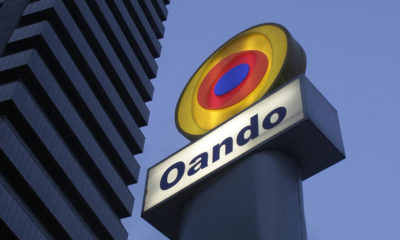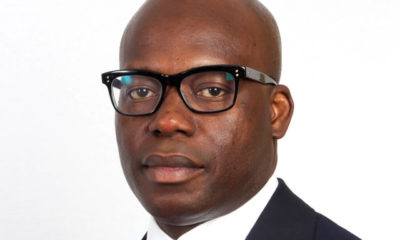- Oando Flays SEC over AGM Suspension
Oando Plc has decried the last-minute suspension of its scheduled annual general meeting (AGM) by Securities and Exchange Commission (SEC). SEC had on Monday ordered the suspension of Oando’s AGM, which had been scheduled for yesterday in Lagos.
Oando’s share price depreciated by 2.60 per cent yesterday in post-announcement trading at the Nigerian Stock Exchange (NSE), representing a loss of N1.24 billion in market value. Oando’s share price dropped by 10 kobo to close at N3.75 per share.
In its official response to the suspension filed at the NSE, Oando stated that the cancellation of the scheduled AGM by SEC was not in the best interests of the Company and its shareholders who have travelled at great expense, from far and wide, to attend the AGM.
“The company also stands to lose significant shareholder funds by the attendant cancellation of the AGM at such short notice,” Oando stated.
Oando noted that it would take all legal steps to protect its business and assets whilst remaining committed to act in the best interests of all its shareholders.
The company said it would soon announce a new date for the AGM.
SEC had stated that the suspension was based on the Ex-parte order of the Federal High Court, Ikoyi, Lagos, which ordered status quo to remain.
Oando disagreed with SEC’s position pointing out that it had by notice to the public and its shareholders on May 10, 2019 validly convened its 42nd AGM.
“The actions contained in the SEC’s letter to the Company dated Friday, May 31, 2019 was effectively put in abeyance by the Ex-parte Order of the Federal High Court, which was granted on Monday, June 3, 2019,” Oando stated.
Several shareholders have also criticized the suspension of the AGM and other actions being taken by the Commission against the indigenous oil and gas company.
Shareholders under the auspices of Pragmatic Shareholders Association of Nigerian (PSAN) called on the Federal Government and other stakeholders to restrain SEC from creating unnecessary panic in the capital market.
According to the shareholders, the suspension of the AGM was counterproductive as both the company and its shareholders will bear the pains and financial burden of the cancelled AGM.
“Oando had planned and piad for this event as far back as May, what happens to all the money that was paid to the vendors to make the meeting a success? This is our hard earned money that has not been used judiciously as a result of SEC’s intervention,” PSAN stated.
SEC stated that it suspended the AGM until further notice to allow the parties maintain status quo adding that it would update relevant stakeholders and the public on the outcome of the ongoing litigation.
SEC had on May 31, 2019 released a statement indicting the management and board of Oando of sundry corporate governance abuses and infractions of the relevant capital market laws.
SEC barred the Group Chief Executive Officer (GCEO) and the Deputy Group Chief Executive Officer (DGCEO) of Oando from being directors of public companies for a period of five years. SEC also ordered certain members of board of directors of Oando to resign.
The apex capital market regulator stated that it had concluded investigation into alleged corporate governance abuses at Oando and found that the company was guilty of serious infractions and market abuses.
SEC also directed the payment of monetary penalties by the company and affected individuals and directors, and refund of improperly disbursed remuneration by the affected board members to the company.
SEC also directed the convening of an Extra-Ordinary General Meeting on or before July 1, 2019, to appoint new directors.
These among others the SEC stated, are part of measures to address identified violations in the company.
According to the SEC, following the receipt of two petitions by the Commission in 2017, investigations were conducted into the activities of Oando. Certain infractions of relevant laws were observed. The Commission further engaged Deloitte & Touche to conduct a Forensic Audit of the activities of Oando.
On June 2, 2019, SEC appointed an interim management team headed by Mr. Mutiu Sunmonu, a former Managing Director of Shell, to oversee the affairs of Oando and to conduct an extra ordinary general meeting on or before July 1, 2019 to appoint new directors to the board of the company, who would subsequently select a management team for Oando.
Oando however described the directives from the SEC as a calculated attempt to prejudice the business of the company.
The company stated that the alleged infractions and penalties are unsubstantiated, ultra vires, invalid and calculated to prejudice the business of the company.
According to the company, it has not been given the opportunity to see, review and respond to the forensic audit report and so unable to ascertain what findings were made in relation to the alleged infractions and defend itself accordingly before the SEC.


 Forex3 weeks ago
Forex3 weeks ago


 Naira2 weeks ago
Naira2 weeks ago
 Billionaire Watch2 weeks ago
Billionaire Watch2 weeks ago




 Naira2 weeks ago
Naira2 weeks ago




 Naira2 weeks ago
Naira2 weeks ago




 Naira1 week ago
Naira1 week ago




 Naira4 weeks ago
Naira4 weeks ago




 Naira3 weeks ago
Naira3 weeks ago















